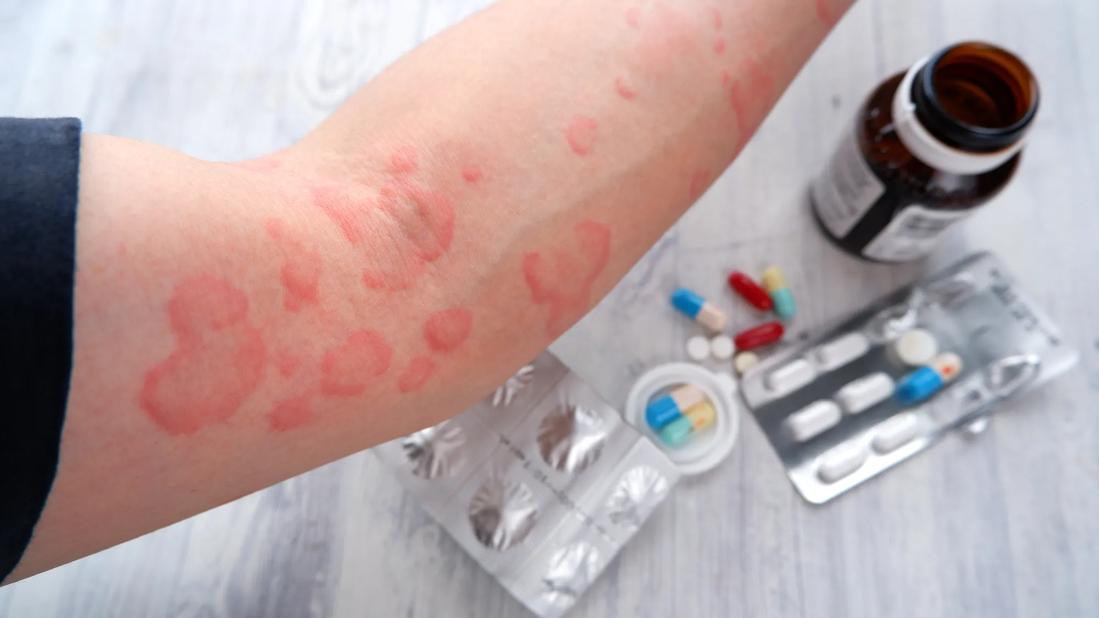If you’re sensitive to aspirin or other salicylates, limiting exposure is the best remedy

Image content: This image is available to view online.
View image online (https://assets.clevelandclinic.org/transform/a8571345-2ecd-40b0-80f3-8991394a19ad/allergic-hives-medicine-1602401193)
Hives on a person's arm from an allergic reaction to medication
Understanding salicylate sensitivity can be challenging. (Almost as challenging as pronouncing “sa-LIS-i-late sensitivity.”) The reason? Salicylates can affect your body in different ways, making it hard to identify the root of your symptoms and confirm a diagnosis.
Advertisement
Cleveland Clinic is a non-profit academic medical center. Advertising on our site helps support our mission. We do not endorse non-Cleveland Clinic products or services. Policy
“People can have different types of reactions, ranging from a mild sensitivity to a life-threatening allergy,” says allergist Dylan Timberlake, MD. “The reactions also vary depending on the type of salicylate.”
Dr. Timberlake explains where you might find these chemicals, symptoms they can cause and what to do if you’re sensitive to them.
Salicylate sensitivity is when your body reacts poorly to foods, products or medications that contain salicylates. These natural compounds are found in many fruits, vegetables, spices and some pain relievers. Synthetic salicylates (made in a lab) are common ingredients in medications and health and beauty products.
The most well-known salicylate reaction is to aspirin. Aspirin can cause a true allergy, where your immune system sees it as a threat and steps into action, creating a variety of symptoms.
Some people with asthma and nasal polyps can have severe reactions to aspirin — not because of a traditional allergy, but due to a different biological response. This condition is called aspirin-exacerbated respiratory disease (AERD). It happens when your body’s response to COX inhibitors like aspirin is disrupted. COX enzymes help process certain chemicals involved in inflammation and allergic reactions.
Advertisement
In people with AERD, this pathway is out of balance, which can trigger intense, even life-threatening respiratory symptoms after taking aspirin or other NSAIDs (nonsteroidal anti-inflammatory drugs).
Whether other salicylates cause allergies or sensitivities isn’t as clear. “True allergies to other salicylates are unlikely due to their chemical structure,” clarifies Dr. Timberlake. “However, it’s possible to have a milder salicylate sensitivity or intolerance.”
Salicylate sensitivity can show up in different ways and vary from person to person.
Symptoms mimic other allergies, food intolerances and illnesses. They might affect your respiratory system, skin or gastrointestinal tract, causing:
Salicylates are common in health and beauty products and certain medications, like:
“Many foods are rich in salicylates, too, although the published levels aren’t always consistent,” notes Dr. Timberlake. “This may be due to variations in the foods themselves or the testing methods.”
In general, foods that seem to contain higher levels of salicylates include:
Diagnosing allergies and sensitivities can be challenging. Healthcare providers rely heavily on how you describe your symptoms and reactions.
If you have an aspirin allergy or AERD, a provider may do a graded dose challenge. In this test, you take a small amount of aspirin in a medical setting to see how you respond.
Limiting your exposure is the main way to manage salicylate sensitivity. You may do this by:
Advertisement
Allergies and sensitivities tend to change over time. For non-life-threatening reactions, Dr. Timberlake recommends periodically exposing yourself to items you’ve been avoiding. You may find you no longer have a reaction.
Advertisement

Sign up for our Health Essentials emails for expert guidance on nutrition, fitness, sleep, skin care and more.
Learn more about our editorial process.
Advertisement
Most antihistamines, like Zyrtec, are OK, but avoid decongestants for at least the first trimester
You can now get lifesaving epinephrine in a nasal spray and prefilled syringes
Drowsiness is a side effect of inflammation, disrupted sleep and, sometimes, your allergy medicine
Mold exposure can cause allergic reactions, asthma and skin rashes
If allergies have you coughing and sniffling all night, try showering before bed, keeping the windows closed and propping your head up
If allergies make your mornings a slog, consider closing the windows and showering at night
When the trees start to bloom, your allergies can come to life — medications, closing the windows and keeping clean can help
Water, touch, sunlight, physical activity and cold are some of the rarest allergies
Prioritize your health by managing stress, strengthening your social connections and getting quality sleep
Bolsters, blankets, pillows and blocks can offer extra support, stability and comfort
Allergies, postnasal drip, asthma or reflux could be to blame for a cough that won’t quit